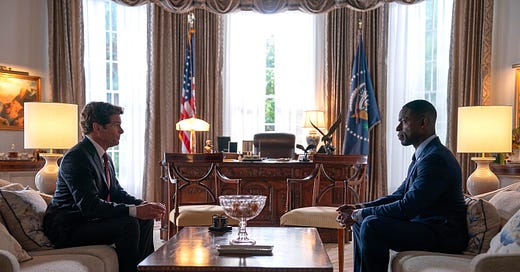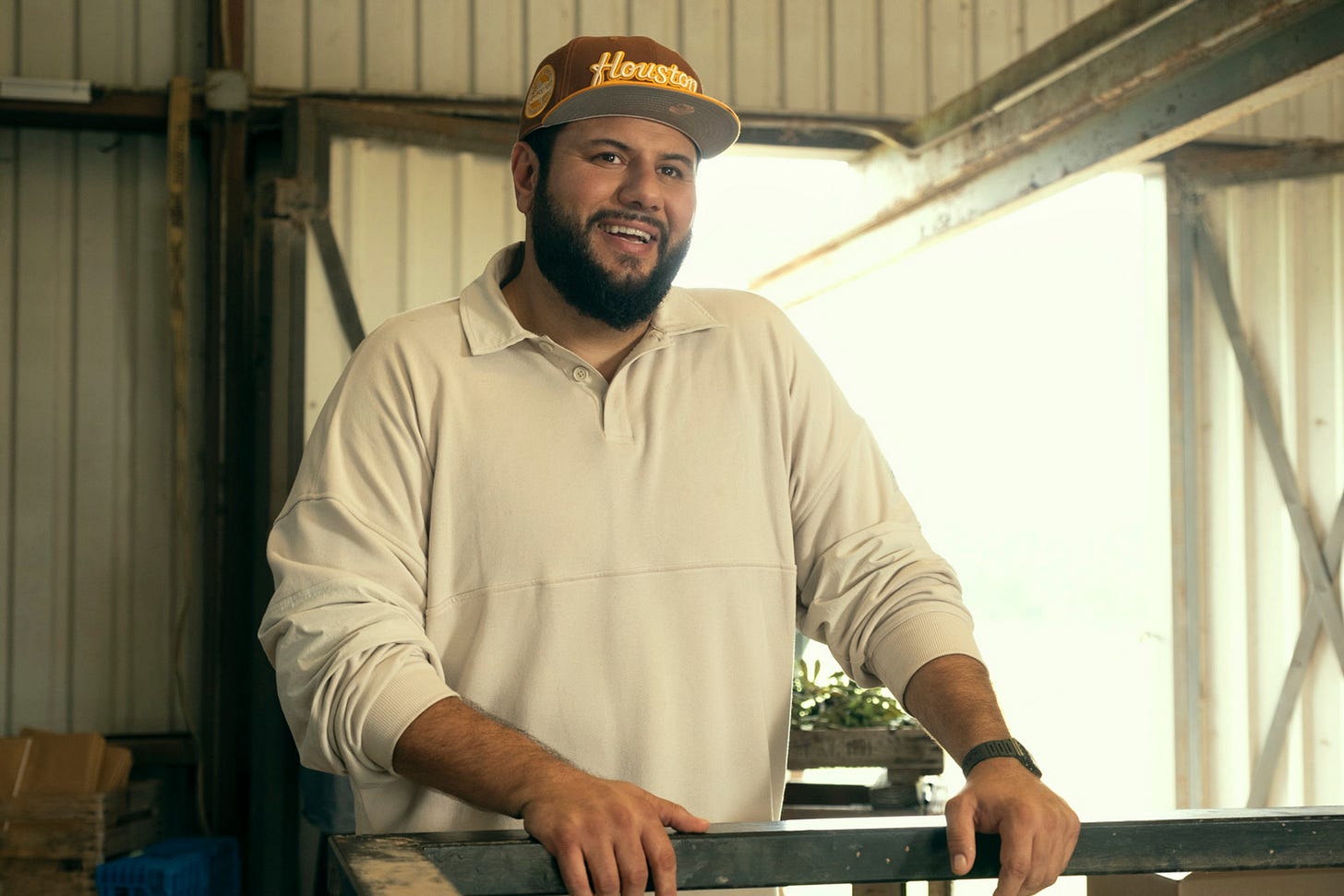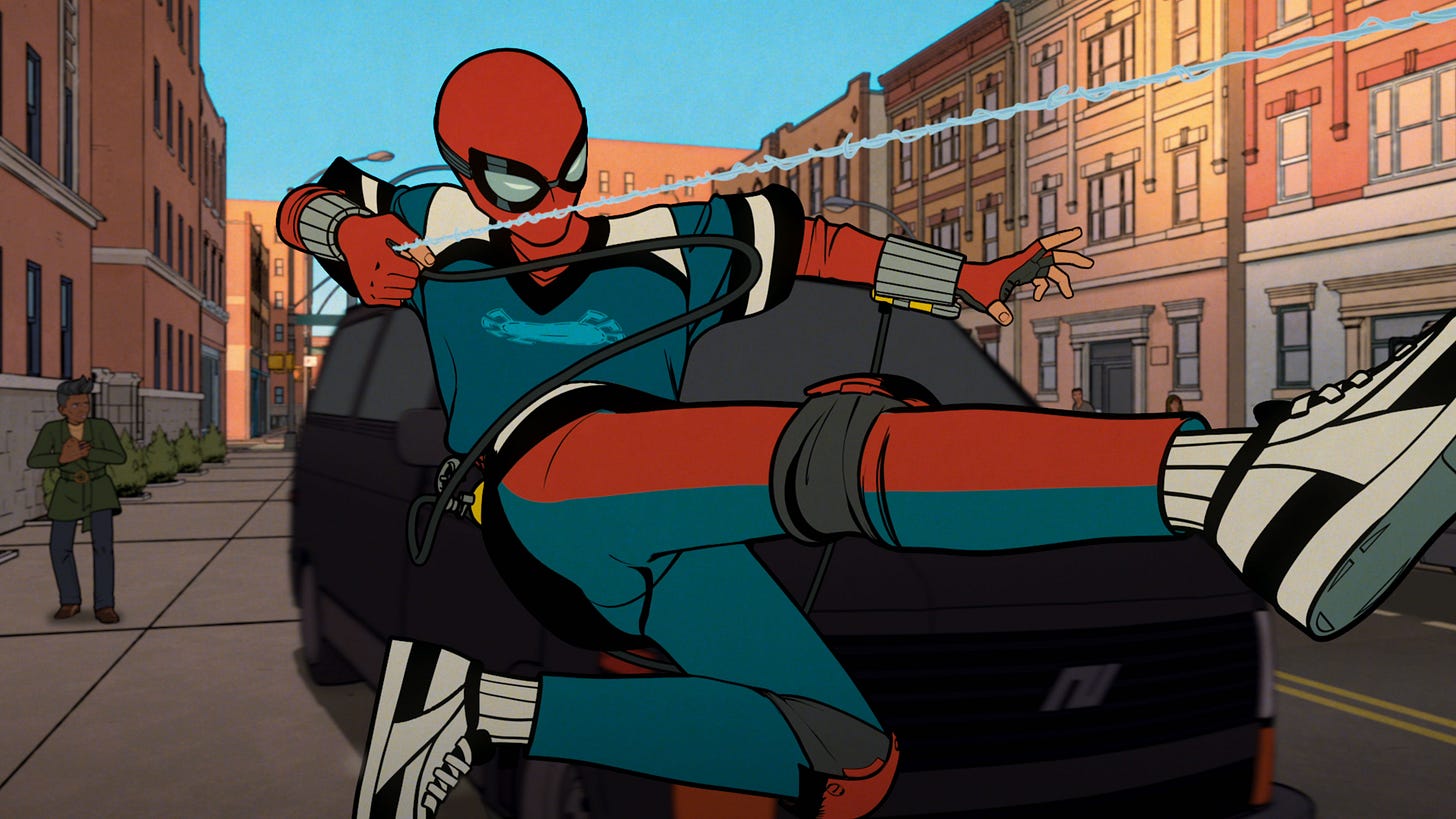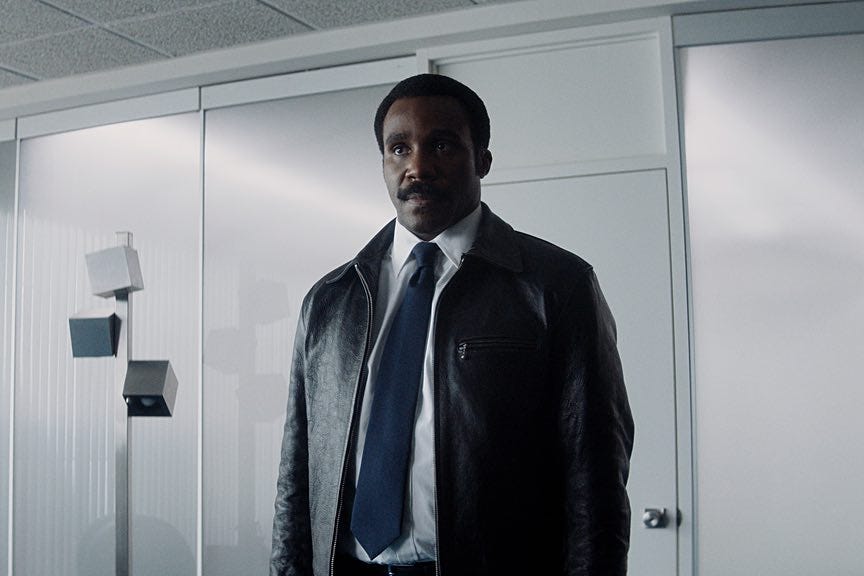Take me down to the 'Paradise' city
'Paradise,' 'Mo,' 'Your Friendly Neighborhood Spider-Man,' 'Mythic Quest,' a big 'Better Call Saul' what if, and a lot more
This week’s What’s Alan Watching? newsletter coming up just as soon as I show you I’m pouchless…
Better Call the other brother?
Because my new book, Saul Goodman v. Jimmy McGill: The Complete Critical Companion to Better Call Saul, is coming out on Tuesday, February 4, you already got a bonus newsletter earlier this week, which included a link to an excerpt in Rolling Stone about Bob Odenkirk’s heart attack, plus reminders about next week’s book events at The Strand in Manhattan (tickets are still available!), and at Words in Maplewood. And there are a lot of other shows we have to talk about in the main Friday newsletter.
However, we’ve got two more pieces of Saul book business to get to. The first is another New York event that was just announced: a conversation with one of the curators at The Paley Center on the afternoon of February 12. I will also be selling and/or signing books there.
The second is another book excerpt, at EW, about the origins of Saul as a character on Breaking Bad. As he was in the discussion of Bob’s health crisis, Peter Gould is extremely candid about what a struggle the original “Better Call Saul” episode of the parent show was like to make, including pushback from executives who didn’t like the idea of the character, as well as Gould’s own difficulty grasping the tone of the series at that point. But the biggest revelation, to me, was when Peter talked about one of the few other names on the Saul Goodman casting wishlist:
Michael McKean. Yeah, that Michael McKean.
It’s an absolutely fascinating what-if. McKean’s comedy resume at the time that episode was made was, if anything, even more impressive than Bob’s. He had also formally studied acting when he was younger, which Bob didn’t, and he had played serious roles in the past, which Bob largely hadn’t. And we obviously know from his work as Chuck McGill that he could do very well with the specific tone that Gould was having a problem figuring out back then. McKean wouldn’t necessarily have been a better Saul Goodman than Bob, but I think he would have been an excellent one.
At the same time, a Breaking Bad prequel where McKean was the leading man would have been trickier. He’s 15 years older than Bob, and the attempts to make him look younger in various flashbacks tended to look silly. McKean’s Jimmy would have to be a substantially different character, I would think. Which means Better Call Saul would have been substantially different. All ultimately worked out as it should. But when Peter told me this, I have to admit it was hard to focus on the next several questions of the interview, because my mind was spinning with thoughts of this sliding doors version of the show.
Paradise / Lost
Like I said, lots and lots of notable premieres this week, two of which I reviewed for Rolling Stone. The first of these is Paradise, a reunion between This Is Us creator Dan Fogelman and star Sterling K. Brown, who plays a secret service agent in a small town investigating the murder of the most recent president, played in flashbacks by James Marsden. As you might expect from a Fogelman show, however, there is a big twist — so big a twist, in fact, that I decided not to attempt reviewing Paradise before its premiere, because it seemed pointless to discuss it if I couldn’t say what it was actually about.
For the benefit of anyone reading the newsletter who doesn’t want to know, I will leave the twist, and the series’ real premise, for everyone else to discover by reading my review. Since it published, I’ve heard a variety of responses, from people who wish the show was just the murder mystery promised by most of the premiere, to those who said they wished Hulu had just advertised the show with the twist, because they’d have been more likely to watch.
As discussed at length in that review, it’s a ridiculous show, and one that often feels made up of pieces of much better ones. (As with This Is Us, there is a ton of Lost DNA here.) But it moves well, and that cast (also including Julianne Nicholson, Sarah Shahi, and Gerald McRaney, among others), is great(*). It’s a mess, but not a dull one.
(*) Also of note in the cast: Brown’s character has two kids, and one of them is played by Percy Daggs IV — aka the son of Veronica Mars star Percy Daggs III. In related news, the Earth just won’t stop going around the sun, dammit.
Mo’s belated, complicated return
Next up: I reviewed Season Two of Mo, the Netflix comedy starring Mo Amer, and created by him and Ramy Youssef. Amer plays a fictionalized version of himself, as a Palestinian refugee living as an undocumented immigrant in Houston while waiting years for his asylum case to be heard. Where Youssef’s great Hulu show Ramy focused primarily on matters of faith, Mo’s first season was more of a farce about the logistics of being undocumented. But part of those logistics were the fact that Mo and his family couldn’t leave the country to visit Palestine, because they would be barred from returning to America after. In that season’s finale, a wacky series of events resulted in Mo being stranded in Mexico, unable to physically or legally get back across the border.
That was in the summer of 2022, and the killing of so many innocent people in Gaza has made Mo’s return a lot more complicated, through no real fault of its own. In my review, I wrote about the series’ difficulty walking this new tightrope. It is fundamentally the same show as before — and even set largely in 2022 and early 2023 — only now any references to Mo’s homeland are fraught and often overpower the jokes in unintended ways. But there are still moments that are very funny, and then the finale, set in Palestine prior to October 7, 2023, is an absolute stunner.
What’s Alan watching (but not reviewing)?
This week had several other notable premieres that I was able to watch but not review, so let’s touch on them briefly:
I wasn’t sure what to expect from Disney+’s new animated series Your Friendly Neighborhood Spider-Man. The marketing went back and forth between suggesting it’s simply set at the very start of the career of the Tom Holland version of Spidey, prior to him meeting Tony Stark in Captain America: Civil War, and making it seem like a different continuity altogether. As it turns out, it’s a bit of both. As Peter Parker, Hudson Thames is more or less just doing a Holland impression, and various plot points echo the events of Civil War. But there are also huge deviations, like Norman Osborn (voiced by Colman Domingo) playing a major role, or Nico Minoru from Runaways being Peter’s best friend. At times, this mixing and matching can be distracting. But on the whole, this is probably the Spider-Man cartoon I’ve enjoyed most after 2008’s Spectacular Spider-Man. The animation evokes a combination of Steve Ditko and Mike Allred, the action scenes are crisp and exciting, and it does a nice job of capturing the hero-in-training aspect of this moment in Peter’s life. I wish this Spidey was more of a wisecracker than Holland’s, where all of the comedy in those movies gets generated from how young, deferential, and overwhelmed he is. But it’s already one of the best of the Disney+ Marvel shows.
Mythic Quest is back for a fourth season on Apple TV+, and it remains one of the best hangs on television. I have a few quibbles with the new batch, like how the annual off-format episode, focusing on Ian’s son Pootie Shoe, is a disappointment compared to how wonderful these have been in previous years. (Though I assume part of that is because there’s going to be a spinoff this spring that is just an anthology of off-format episodes set in this universe.) But the characters are so well-drawn at this point that it’s fun to watch them even if there no longer seem to be any real stakes at work. In particular, the season does some really excellent stuff with how dysfunctional Ian and Poppy’s relationship has gotten by this point. Glad to have it back.
This is the second season in a row that Netflix’s The Recruit is getting the newsletter-only treatment. That Netflix premiered new seasons of this and The Night Agent in consecutive weeks makes for an interesting contrast. Both of them are deliberate throwbacks to the kinds of more populist light dramas that were abundant on basic cable in the 2000s and early 2010s, involving young guys who are in way over their heads in spy-adjacent jobs. In their first seasons, I probably preferred Night Agent, which felt more propulsive, and which was easier to follow than the globetrotting Recruit story. This time, though, I haven’t yet finished Night Agent, while I blitzed through my Recruit screeners. It’s still a show that can give you a headache from trying to keep up with all the plot threads. And the attempts to give Noah Centineo’s cocky CIA lawyer a deeper emotional life never really work in a show that’s otherwise a sugary confection. But I can’t deny that it’s fun, and briskly-paced in a way that often turns that confusing narrative style into an asset, as if you’re just as ill-prepared to keep up with it all as Centineo. Whereas Night Agent Season Two feels a bit more sluggish and angst-ridden than it was last time around. Both shows are silly, but The Recruit embraces its silliness, where Night Agent more frequently wants to be taken seriously, with mixed results.
I gave CBS’ new Watson a look, both because this has turned out to be a pretty good year for broadcast network procedurals like Matlock and High Potential, and because the concept behind it was so weird that my curiosity got the better of me. Basically, imagine House — aka a hospital drama take on Sherlock Holmes — only House this time is the actual Dr. Watson from the Sherlock Holmes stories, returning to his medical practice after Holmes dies (or appears to die) at Reichenbach Falls. Like I said, weird. Now add to that the fact that it’s created by a veteran of another modern-day Sherlock Holmes show, Elementary, and there’s just a lot going on. Unfortunately, I found the first episode pretty dull, and Morris Chestnut as Watson wasn’t charismatic enough for me to want to sample more. When it’s more fun to explain what the show is than it is to actually watch it, that’s not ideal.
Odds and/or ends
After puttering around with various action movies on the treadmill, and occasionally succumbing to watching a few ER episodes again, I finally switched to another show I’ve seen a time or five: Band of Brothers, the HBO World War II epic from 2001. (Those of you who were reading me on the original What’s Alan Watching? site might recall that I revisited every episode there way back in the summer of 2009.) While I would probably argue that The Pacific (which I rewatched last year) has higher highs, Band remains easily the most rewatchable of the three Hanks/Spielberg miniseries on the subject, and its strengths were particularly apparent with the disappointing Masters of the Air having premiered not that long ago. The funny thing about returning to Band every now and then is that each time, I somehow notice a different actor playing a minor role who has since become incredibly famous. Back in those ‘09 recaps, for instance, I wrote about James McAvoy and Simon Pegg, both in blink-and-you’ll-miss-them roles, but it wasn’t until my next watch a few years later that I recognized a young and skinny Tom Hardy as a private in the last two episodes. This time around, the ones who stuck out were Andrew Scott, as the private from another company who spends D-Day following Dick Winters through Normandy, and Michael Fassbender, who’s actually in most of the episodes, but in a very small role as one of the original members of Easy Company who makes it all the way to the end of the war. I wonder whom I’ll spot the next time I do this in a few years.
This week’s The Pitt takes us to the one-third mark of the 15-episode season, and does a good job of demonstrating the strengths of the idea of following one shift over an entire season. Sure, a single episode focusing on this shift would have room for some of these ongoing threads, like the running gag about Whitaker constantly needing new scrubs, or the increasingly complicated case of the teenage girl seeking a medical abortion. But there wouldn’t be room for all of them, and certainly not told with this level of detail and nuance. I have mixed feelings about the structure on the whole, but this episode’s a really good example of it. And at the same time, we get more traditional advancement of other character arcs, like McKay revealing more about how she wound up wearing the ankle monitor. And we also got some effective thematic pairings, like McKay dealing with the exhausted unhoused mother, while Mel bonds with the exhausted daughter of an eldercare patient. Good shows continues to be good; news at 11.
The goat Severance episode (but not the GOAT Severance episode)
Finally, it’s Severance recap link time. Lots to chew on in this episode: the strange gift Milchick receives to celebrate his promotion, my ongoing question about Helly vs Helena, various severed love triangles, and the big decision Outie Mark makes at the episode’s end. And, of course, a return to one of the weirdest ideas introduced in Season One: that there is an entire room of baby goats down on the severed floor.
How is everyone feeling about the season so far?
That’s it for this week!










I watched the first two episodes of Paradise and… I liked it! No disagreement from me that it’s a bit ridiculous but I found the characters compelling especially Sterling K Brown. I like that it’s bright lit unlike (ahem) that other show. I just think it’s fun and will continue watching.
Did anyone else getting Better Call Saul vibes from the opening shot/scene of Cobel's car in the middle of nowhere? Maybe it's just because of Alan's book I have Saul on my mind haha.